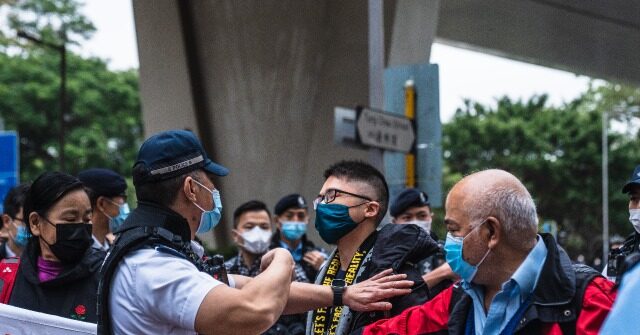The tide of protests and other acts of dissent — including posting banners, distributing petitions, or individual protest posts that grew tremendously in China throughout 2022 — has yet to ebb, the Freedom House China Dissent Monitor revealed in its latest update this week.
The China Dissent Monitor — a project that documents, verifies, and analyzes instances of protest in the country — confirmed 2,230 “dissent events” in the totalitarian communist country between June 2022 and last April, stating that “at least 29,000 people” have participated in protests in that timeframe. That number, the analysts noted, represents only those people engaging in events that the organization has coded into its system, 1,432 of the 2,230 dissent events, meaning the true number is likely significantly higher.
“78 percent were demonstrations and marches, 10 percent were sign protests, 4 percent involved obstruction and occupation, 3 percent were collective petitioning and 3 percent were labor strikes,” the report detailed.
China’s communist regime brutally punishes public expressions of dissent against the regime using Orwellian laws such as “picking quarrels and provoking trouble” to silence dissatisfaction with the regime. Known anti-communist activists — and, often, the attorneys who dare to represent them — often disappear into the penal system and die there, with little access to their families and no legitimate due process. Also in the Communist Party’s crosshairs are people of faith, particularly Christians, Muslims, Tibetan Buddhists, and Falun Gong practitioners. Christianity, Buddhism, and Islam are legal only under the direct control of the Party — meaning those who pray without government supervision break the law — while the government considers the Falun Gong spiritual movement, which prioritizes forbearance, health, and individuality, an “evil cult” worthy of extermination.
Despite the high probability of government persecution, thousands of Chinese people have consistently participated in protests in the past year. Anti-government dissent appeared to peak last year amid the horror of the “zero-Covid” policy, which mandated city-wide lockdowns causing starvation and needless deaths from lack of basic medicine. Beijing also used the policy to imprison untold numbers in dirty, repressive quarantine camps in the name of allegedly preventing the spread of the Wuhan coronavirus.
Freedom House declared dissent a “daily occurrence in China” last year, citing its research.
The “zero-Covid” policy has come and gone, but dissent persists — and, even during that protest movement, the participants used their stance to object to communism generally, not just public health provisions. A common form of protest in China last year became known as the “blank paper” protests, in which protesters held up blank sheets of paper to protest the government’s censorship, defying police to arrest them for saying nothing.
Watch — China: Hundreds Protest Communist Censorship by Holding Up Papers Saying…Nothing
The latest China Dissent Monitor report found that grievances had shifted in many cases to workers demanding unpaid wages — a sign that China’s stagnant economy has not improved since the end of the coronavirus lockdowns — and owners demanding real estate companies deliver on promised housing developments they have failed to construct in time as per their contracts. These protests, often targeting construction and real estate companies rather than the Communist Party, face less repression than those demanding the government intervene or mentioning the Party in any way.
Freedom House noted that the government is not blameless for the protests involving construction and housing projects, as it violently represses worker movements — despite being nominally communist — and often allows corporations to break the law.
The China Dissent Monitor detailed:
The Communist Party has systematically suppressed efforts by workers to form independent labor unions that could reduce the incidence of employers refusing to pay employees…While China has relatively strong de jure labor protections, they are widely disregarded by employers because inspection and enforcement is ineffective. Relatedly, when courts or arbitration committees do handle labor disputes, they often break up collective grievances into individual cases, weakening the leverage of workers.
The Monitor documented the highest number of acts of dissent in the heart of the nation — Hebei, Henan, Shandong, and Shaanxi provinces. It notably could not verify a single protest in the occupied regions of Tibet and East Turkistan, likely more indicative of how the Uyghur genocide in the latter and the ethnic cleansing projects against Tibetans have made it difficult, if not impossible, for residents to maintain contact with the outside world. It noted that it nonetheless documented dozens of protest acts among religious communities.
“Since June 2022, CDM has recorded 34 acts of dissent among Falun Gong practitioners, Tibetans, Christians, Muslims, and ethnic Mongolians,” the report read. “Their resistance is expressed through non-cooperation, artistic expression, online posts, and sometimes offline demonstrations.”
Watch: Uyghur Muslims Protest Against the Chinese Government
Penny Starr / Breitbart News
As the latest report includes protests from June to November 2022, it still contains acts against the coronavirus lockdowns, which elevated the number of acts of protests across the nation.
Watch: Anti-Lockdown Protests Break Out Across China
Early reports between April 2023 and press time indicate that protests remain vigorous in the country. Last weekend, reports surfaced that thousands of people in southern Yunnan province, China, attacked police to protect a local mosque the government had targeted for demolition. Yunnan is home to a large population of Hui Muslims, who are ethnically Han Chinese but practice Islam. The Communist Party attempted to demolish the 13th-century Najiaying Mosque, which received a remodel in 2004 to make it more consistent with Middle Eastern mosques, citing alleged building code violations. Protesters threw bricks, rocks, and other projectiles at riot police in an attempt to protect the mosque’s dome, temporarily halting the demolition.
Chinese officials are preparing for the anniversary of the 1989 Tiananmen Square massacre this weekend by heavily censoring any content that could potentially remind citizens of the government’s brutal killing of peaceful protesters, a sign Beijing expects some popular expressions against its agenda.


